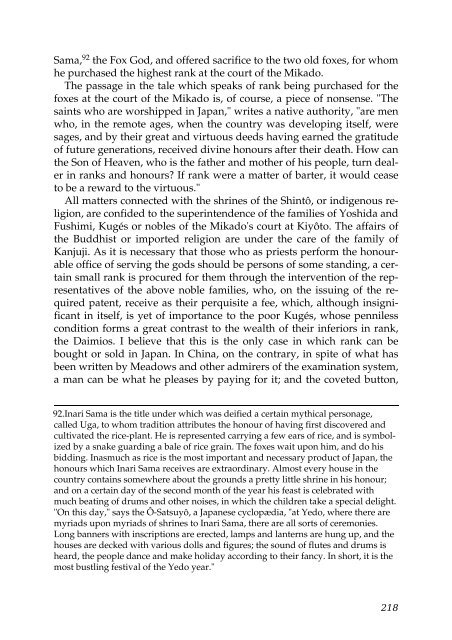You also want an ePaper? Increase the reach of your titles
YUMPU automatically turns print PDFs into web optimized ePapers that Google loves.
Sama, 92 the Fox God, and <strong>of</strong>fered sacrifice to the two old foxes, for whom<br />
he purchased the highest rank at the court <strong>of</strong> the Mikado.<br />
The passage in the tale which speaks <strong>of</strong> rank being purchased for the<br />
foxes at the court <strong>of</strong> the Mikado is, <strong>of</strong> course, a piece <strong>of</strong> nonsense. "The<br />
saints who are worshipped in <strong>Japan</strong>," writes a native authority, "are men<br />
who, in the remote ages, when the country was developing itself, were<br />
sages, and by their great and virtuous deeds having earned the gratitude<br />
<strong>of</strong> future generations, received divine honours after their death. How can<br />
the Son <strong>of</strong> Heaven, who is the father and mother <strong>of</strong> his people, turn dealer<br />
in ranks and honours? If rank were a matter <strong>of</strong> barter, it would cease<br />
to be a reward to the virtuous."<br />
All matters connected with the shrines <strong>of</strong> the Shintô, or indigenous religion,<br />
are confided to the superintendence <strong>of</strong> the families <strong>of</strong> Yoshida and<br />
Fushimi, Kugés or nobles <strong>of</strong> the Mikado's court at Kiyôto. The affairs <strong>of</strong><br />
the Buddhist or imported religion are under the care <strong>of</strong> the family <strong>of</strong><br />
Kanjuji. As it is necessary that those who as priests perform the honourable<br />
<strong>of</strong>fice <strong>of</strong> serving the gods should be persons <strong>of</strong> some standing, a certain<br />
small rank is procured for them through the intervention <strong>of</strong> the representatives<br />
<strong>of</strong> the above noble families, who, on the issuing <strong>of</strong> the required<br />
patent, receive as their perquisite a fee, which, although insignificant<br />
in itself, is yet <strong>of</strong> importance to the poor Kugés, whose penniless<br />
condition forms a great contrast to the wealth <strong>of</strong> their inferiors in rank,<br />
the Daimios. I believe that this is the only case in which rank can be<br />
bought or sold in <strong>Japan</strong>. In China, on the contrary, in spite <strong>of</strong> what has<br />
been written by Meadows and other admirers <strong>of</strong> the examination system,<br />
a man can be what he pleases by paying for it; and the coveted button,<br />
92.Inari Sama is the title under which was deified a certain mythical personage,<br />
called Uga, to whom tradition attributes the honour <strong>of</strong> having first discovered and<br />
cultivated the rice-plant. He is represented carrying a few ears <strong>of</strong> rice, and is symbolized<br />
by a snake guarding a bale <strong>of</strong> rice grain. The foxes wait upon him, and do his<br />
bidding. Inasmuch as rice is the most important and necessary product <strong>of</strong> <strong>Japan</strong>, the<br />
honours which Inari Sama receives are extraordinary. Almost every house in the<br />
country contains somewhere about the grounds a pretty little shrine in his honour;<br />
and on a certain day <strong>of</strong> the second month <strong>of</strong> the year his feast is celebrated with<br />
much beating <strong>of</strong> drums and other noises, in which the children take a special delight.<br />
"On this day," says the Ô-Satsuyô, a <strong>Japan</strong>ese cyclopædia, "at Yedo, where there are<br />
myriads upon myriads <strong>of</strong> shrines to Inari Sama, there are all sorts <strong>of</strong> ceremonies.<br />
Long banners with inscriptions are erected, lamps and lanterns are hung up, and the<br />
houses are decked with various dolls and figures; the sound <strong>of</strong> flutes and drums is<br />
heard, the people dance and make holiday according to their fancy. In short, it is the<br />
most bustling festival <strong>of</strong> the Yedo year."<br />
218



